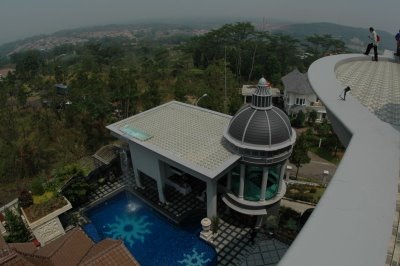Versailles of the East





I never would have guessed that Indonesia would be the location of my first Evangelical Christian wedding. I’ve hung out with Evangelicals all over the world, from Thailand to Mississippi, but never in a Versailles-like palace, complete with Italian marble balustrade and Louis XVI original armoires. Nico, the seventy-five year-old Indonesian man that John and I met while trying to find a bookstore, proved to be the stereotypical crazy, gay uncle of the family, but his fondness for bule granted the two of us access to a social scene that until yesterday, I’d only read about.
We met Nico at his house at 8.00AM, and were whisked away in a caravan of SUV’s to a suburb of Jakarta called Sentul. The gated community we entered was home to dozens of Mediterranean style villas, perched thousands of feet above the dry, rolling hills of West Java. The house where the wedding service was held belongs to the bride’s father (it turns out Nico never married, and many of the tales that he spun for John and me in his broken English were totally fabricated, as corroborated by the various family members we befriended throughout the day) who made his money selling “office supplies.” We didn’t prod any further.
The compound must have been forty thousand square feet. The photos above don’t really do it justice. The palace was an Indonesian nouveau riche take on seventeenth century opulence and elite social standing. The father of the bride, a practicing Muslim, had built a prayer house next to the pool in the backyard. A legitimate waterfall fell forty feet from the prayer house’s roof into the gunnite lined pool, surrounded by bronze sphinxes and Sundanese textile weavings.
Beyond the sheer opulence that surrounded me, what struck me most was the obvious juxtaposition of East and West. An enormous, fat white man (he must weigh 350 pounds) delivered a heavy-handed, culturally generic sermon to a crowd of some one hundred people, of whom only John and I understood his rapid, southern inflected diatribe on forgetting the past, starting anew, and building a family based not on a shared history, but on the promise of the predetermined path. The service was accompanied by an Indonesian Christian rock quintet, which burst into mispronounced rounds of variations on the savior and squawky electric guitar solos.
Indonesia is ninety percent Muslim, but it seems that Jakarta is home to a disproportionately large number of Christians, many of whom belong to the country’s upper crust. Religion here is treated like an appendage – along with your home and marital status, your religion is a point of introduction in everyday conversation. Beyond the five culturally accepted religions – Islam, Buddhism, Hinduism, Catholicism, and Protestantism – religions are not recognized. Being a Jew puts me in an interesting situation.
On the one hand, as a “cultural ambassador,” I feel obligated to share with people that Jews don’t have horns, they all don’t live in Israel, and they all don’t hate Muslims. On the other, explaining “Yahudi” tests the limits of my abysmal Indonesian skills, and also, I’ve been told, is an excellent way to garner otherwise unsolicited antipathy and hatred. Consequently, in normal conversation and on my security card issued by the government, I say that I’m Kristen (Christian), which is usually enough of an answer for most people.
Those people to whom I reveal my religion are often unfamiliar with the concept of Judaism. I venture “saudara Ibrahim” (brothers of Abraham), and try to steer away from any connection to Israel, which is perceived and talked about here as the “permanent aggressor.” Even my Bahasa Indonesia teacher, Ony, who spent a year on a Fulbright grant studying at Stanford, thought that the word Jew was interchangeable with Israeli.
John and I spent the evening at Hotel Dharmawangsa, one of Jakarta’s swankest spots. While we were only two of roughly one hundred guests at the morning service at Versailles, at the night reception, there must have been fifteen hundred people. We were the only bule there, and were worried about being perceived as bums off the street who had come to cash-in on the deluxe buffet and dessert bar. Our fears were assuaged, however, within a few minutes, when we saw our faces broadcast onto a twenty-foot wide projection screen, giving our muted congratulations via digital video tape to the bride and groom. We had been recorded individually that morning while drinking coffee and making small talk next to the waterfall. And now here we were, two scruffy, random white dudes, eating tiramisu and rubbing shoulders with the country’s hoi palloi. We didn’t need money or friends or supermodel girlfriends. We were bule.

0 Comments:
Post a Comment
<< Home